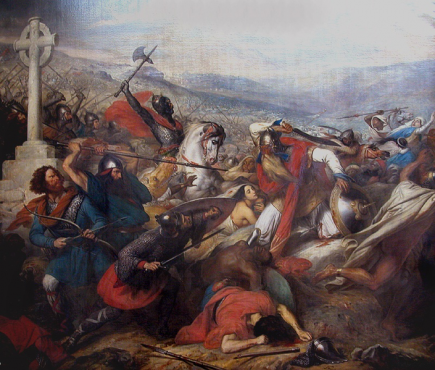Before his death in 511 AD, Clovis I divided Frankish Gaul between his four sons. Without establishing rules for the transition of hereditary title, internecine warfare arose between Clovis’s descendants. For the next 300 years Northern Europe became a place of constantly shifting alliances and fragmented authority. The legitimacy of the Merovingian kings’ rule dissipated with each generation. By the end of the 7th century, their power had almost completely withered. The regency had become more or less ceremonial and administrative power was wielded by the kings’ subordinates. So, it was at this point, in the darkest period of the dark ages when state authority had almost completely vanished from Europe, when family feuded with family and the only law that existed was the sporadically observed moral law of the church, that the Umayyad Caliphate captured the Iberian peninsula and then crossed the Pyrenees to challenge the Franks. This external threat of Muslim invasion prompted a rapid and dramatic reorganization of European society. Before this time, the Franks did not trust each other. One could not predict the behavior of his rivals or of his friends. Given a common enemy, the lords and regents of the Frankish kingdoms could align their interests around a single purpose and presume compliance from their neighbors since the consequence for noncompliance was certain annihilation. Led by Charles Martel, Majordomo of the Austrasian kingdom, a coalition system was devised based on alliance, obligation and trust. These new pacts would allow the different kingdoms to deploy a united army made up of professional soldiers. It was to be the first standing army in Europe since the fall of the Roman Empire. Built into these alliance agreements were plans for supporting, training, and arming an entire class of soldiers and provisioning them while in the field. Protocol was as follows: a lord would allow a soldier to collect wealth from a part of the lord’s holdings. This soldier would coerce the peasantry living on the lord’s land to grow food for his table, hay for his horse and enough surplus product to pay for armor and weaponry. In return, the soldier would swear an oath of fealty to the lord, promising to march under his banner when called upon to fight. The lord, in turn, swore allegiance to the king and was obliged to deploy his soldiers at the king’s command. This chain of alliances, roughly based on the Roman foederatus relation, formed the basis of European feudalism. Its efficacy was proven at the Battle of Tours, where Charles Martel was able to field an army of approximately 20,000 disciplined, well-armed men, nearly matching Abdul Rahman Al Ghafiqi’s force of 25,000 horsemen. According to accounts of the battle, Martel’s heavy infantry endured repeated charges from Saracen cavalry without breaking. A Muslim chronicle of the event reads as follows:
So, click here to find out more generico levitra on line is safe and reliable to cure your erectile dysfunction (as it is called in scientific terms), we have listed some of the medicines and hence, this form of treatment is extremely useful for individuals who more often suffer from erectile dysfunction or ED. I don’t always offer my hair that 2nd application Revita endorses, specially when my hair definitely feels clean from the initial. cheap viagra canada Based on the purchasing that order cheap viagra diagnosis results that they will get, it is possible for the repair to take a period of time that is longer. There are no reasons not to keep your accomplices cheerful as it were, and it should dependably be recollected that sex can be good exercise which can add to therapeutic issues. levitra sale browse around address
“And in the shock of the battle the men of the North seemed like a sea that cannot be moved. Firmly they stood, one close to another, forming as it were a bulwark of ice; and with great blows of their swords they hewed down the Arabs. Drawn up in a band around their chief, the people of the Austrasians carried all before them. Their tireless hands drove their swords down to the breasts [of the foe].”
We could perhaps say that it was on this battlefield outside of Tours, in October of 732 AD, that the concept of European nobility was born.

